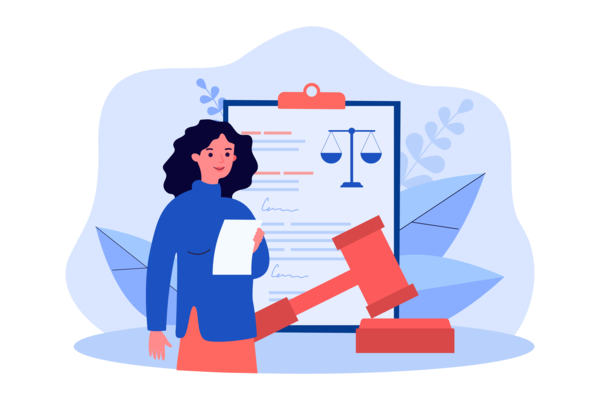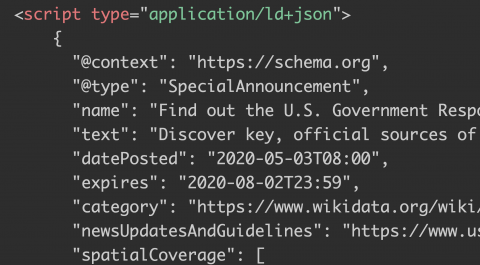Search engine optimization
Search engine optimization (SEO) is the practice of enabling search engines to index and surface content.
Strong search engine optimization (SEO) fosters transparency and enhances user experience. It empowers the public to navigate complex programs, and find the information they need quickly. Accurate and informative search results improve user experience, minimizing frustration and wasted time on irrelevant pages. Creating a search experience that directs users to the information they seek reduces reliance on contact centers and other support channels. It also saves users’ time.
21st Century Integrated Digital Experience Act & OMB Memo M-23-22

Resources on Search engine optimization
-
Search optimization for PDF documents
Understand how to optimize search for PDFs
-
Advanced search engine optimization
Understanding advanced SEO
-
An introduction to search
Learn why search functionality is an important component of federal websites, and discover how to add a search function to your website.
-
An introduction to XML sitemaps
Search.gov explains how and why to create an XML sitemap.
-
An introduction to robots.txt files
Understand how and why to create a robots.txt file
-
Making the big move: Search in support of federal web modernization
In this special report, we discuss a website redesign’s nine phases and their impact on search.
Search engine optimization events
Optimization Case Study: Performance, SEO, and Accessibility with CFPB
Search engine optimization news
Search.gov year in review: 2023 report
Learn what types of information people searched for on federal websites in 2023, see emerging trends the team is exploring to improve customers’ search experience in 2024, and check out three new updates. The data tab provides insightful summaries for 13 popular topic areas—and lists the public’s top 25 search terms, in their own words, for each. — via Search.gov

Why the American People Deserve a Digital Government
OMB released new policy guidance for government that includes a variety of actions and standards to help federal agencies design, develop, and deliver modern websites and digital services. Memo M-23-22, Delivering a Digital-First Public Experience, will make it seamless for the public to obtain government information and services online, and help agencies fully implement the 21st Century Integrated Digital Experience Act (21st Century IDEA). — via The White House

A conversation about content audits
Content audits can be tedious. Two content designers discuss why we do them anyway, and how to get started.
Making the big move: Search in support of federal web modernization
In this special report, we discuss a website redesign’s nine phases and their impact on search. — via Search.gov

Planning and implementing a search engine for a redesigned federal government website
In this blog, we walk you through our planning and implementation process for Search.gov. We share lessons learned, as well as resources we found useful. — via Office of Natural Resources Revenue

Resources on Search engine optimization
-
Search optimization for PDF documents
Understand how to optimize search for PDFs
-
Advanced search engine optimization
Understanding advanced SEO
-
An introduction to search
Learn why search functionality is an important component of federal websites, and discover how to add a search function to your website.
-
An introduction to XML sitemaps
Search.gov explains how and why to create an XML sitemap.
-
An introduction to robots.txt files
Understand how and why to create a robots.txt file
-
Making the big move: Search in support of federal web modernization
In this special report, we discuss a website redesign’s nine phases and their impact on search.
More News and Events on Search engine optimization
15 posts
Search.gov year in review: 2023 report
Learn what types of information people searched for on federal websites in 2023, see emerging trends the team is exploring to improve customers’ search experience in 2024, and check out three new updates. The data tab provides insightful summaries for 13 popular topic areas—and lists the public’s top 25 search terms, in their own words, for each. — via Search.gov

Spring 2024 Community Summit
Why the American People Deserve a Digital Government
OMB released new policy guidance for government that includes a variety of actions and standards to help federal agencies design, develop, and deliver modern websites and digital services. Memo M-23-22, Delivering a Digital-First Public Experience, will make it seamless for the public to obtain government information and services online, and help agencies fully implement the 21st Century Integrated Digital Experience Act (21st Century IDEA). — via The White House

A conversation about content audits
Content audits can be tedious. Two content designers discuss why we do them anyway, and how to get started.
Planning and implementing a search engine for a redesigned federal government website
In this blog, we walk you through our planning and implementation process for Search.gov. We share lessons learned, as well as resources we found useful. — via Office of Natural Resources Revenue

Judiciary Launches New Federal Ticket Processing Website
Individuals can now pay tickets for minor federal violations more easily, using a redesigned website for the Judiciary’s Central Violations Bureau. The website, officially launched in early May, leverages new technologies and best design practices to improve usability and accessibility across devices, including smart phones. — via Administrative Office of the U.S. Courts

Optimization Case Study: Performance, SEO, and Accessibility with CFPB
Tapping Into SEO: How Government Websites Can Improve Content Reach
Implementing a few easy steps for research and search engine optimization can help boost your content and get it in front of the right audience.
Experimenting with SpecialAnnouncement Markup (Updated June 09, 2020)
What USA.gov learned during its pilot with SpecialAnnouncement markup to make COVID-19 information easier to find in search results, now updated to reflect changes by major search engines.
Connecting Americans to Coronavirus Information Online
The American people need access to the most up-to-date public health guidance and information on coronavirus testing facilities. To help Americans find coronavirus information online, incorporate Schema.org’s new standard tags into all web pages related to COVID-19. — via The White House

Spring Cleaning Tips for Web Content
This week, we’re providing a few tips for tidying up redundant, outdated, and trivial content.
User Experience (UX) vs. Customer Experience (CX): What’s the Dif?
“User Experience” and “Customer Experience.” They sound pretty similar, right? Well, here at the Office of Citizen Services and Innovative Technologies, we look at it like this: User Experience (UX) deals with people interacting with your product and the experience they receive from that interaction. UX is measured with metrics like: success rate, error rate,













